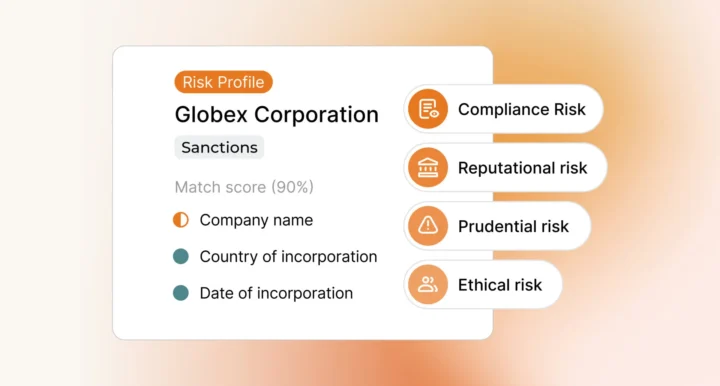Italy is a wealthy Mediterranean nation with one of the largest economies in Europe and a historically-strong manufacturing industry. A busy trade hub, Italy’s international businesses export products, including cars, furniture, food, clothing, and luxury goods, around the world.
While Italy’s economic development created prosperity, it has also attracted criminals who exploit the country’s financial system to launder money and commit other crimes. That criminal threat is ongoing: in a 2023 Europol investigation, Italian authorities discovered criminal gangs perpetrating trade-based money laundering across Europe, with around €18.5 million traced back to Italy alone. Later, Italian authorities uncovered a money laundering network between Italy and China, with prosecutors seizing €292 million in illegal funds.
Italy’s government has responded to the money laundering threat by implementing strict anti-money laundering (AML) and counter-financing of terrorism (CFT) regulations, in keeping with its EU and global obligations. With money laundering still a serious threat, it’s important that firms understand Italy’s AML regulations, and how to achieve compliance.
Italy’s AML Regulator: The Bank of Italy
The Bank of Italy is Italy’s primary AML regulator and provides supervision for all banks and financial institutions in the country, including asset management companies, intermediaries, and trusts. Headquartered in Rome, the bank functions to “ensure the monetary stability and financial stability” of the Italian economy, and has the following duties and responsibilities:
- Preparing and developing AML/CFT regulations in coordination with the Italian parliament and government.
- Developing methods to assess and analyse AML/CFT compliance in supervised banks and financial institutions.
- Implementing penalties and sanctions on entities found to be violating AML/CFT compliance rules.
- Conducting periodic analysis of AML/CFT risks across the financial sector.
- Publishing and disseminating documentation pertaining to AML/CFT regulation.
- Participating in international AML/CFT efforts with foreign regulatory counterparts, including strengthening cross-border AML/CFT supervision.
There are other regulatory bodies that are tasked with supervising Italy’s financial institutions. These are:
- Istituto per la Vigilanza sulle Assicurazioni (IVASS): Supervision of Italy’s insurance and reinsurance businesses.
- Commissione Nazionale per le Società e la Borsa (CONSOB): Supervision of Italy’s securities and investment businesses.
Italy is also a member of the Financial Action Task Force (FATF), the intergovernmental organisation that sets global AML policy. The FATF issues AML recommendations that must be implemented as part of domestic law.
Italy’s Key AML Regulations
Italy’s main AML regulation is Legislative Decree No.231 2007, which sets out the definition of the crime of money laundering in Italy, and the need for cooperation between financial institutions and authorities in ensuring compliance. The Decree requires firms in Italy to take a risk-based approach to AML/CFT compliance (as prescribed by the FATF), which means that they must assess the criminal risk that their customers pose, and then implement a proportionate compliance response.
Anti-Money Laundering Directives: As a member of the EU, Italy must implement the EU Parliament’s Anti-Money Laundering Directives (AMLD) in domestic law. Accordingly, Italy periodically updates Legislative Decree No.231/2007 in order to meet the EU’s new AML standards. The latest EU AMLD was the Sixth Anti Money Laundering Directive (6AMLD) which came into effect on 3 June 2021.
How to Comply with Italy’s AML Regulations
In order to meet the requirements of risk-based AML regulations, firms in Italy must implement the following measures and controls:
- Customer due diligence: Firms should seek to establish and verify the identities of their customers in order to perform accurate risk assessments. The customer due diligence (CDD) process may involve the submission of names, addresses, and other information, including biometric identifiers.
- Beneficial ownership checks: Firms in Italy should also carry out beneficial ownership checks on customer entities in order to prevent criminals hiding their identities with shell companies or behind corporate infrastructure.
- Transaction screening: Firms must be able to screen their customers’ transactions for money laundering risk indicators such as unusual transaction patterns, or transactions with high risk counter-parties.
- Sanctions and watchlist screening: Firms must screen to determine whether customers are designated on watchlists, such as politically exposed persons (PEP) lists. Similarly, firms should screen against international sanctions lists, such as the EU Consolidated List, to ensure they do not offer services to sanctioned customers or violate international law.
Adverse Media Screening in Italy
In a risk-based compliance system, it is vital that firms capture and understand the level of risk that individual customers present. One of the most effective ways of doing this is to screen for adverse media that involves their customers, since news stories often contain valuable information about AML risk before it is confirmed by official sources such as government or police departments.
Adverse media screening (or negative news screening) requires searches of domestic Italian and global news stories in multiple languages. Searches should cover screen and print media, along with new media formats, such as blogs, social media posts, and forums. The screening process can be complex, and must account for factors such as language differences, content duplication, platform credibility, linguistic idiosyncrasies, nicknames, and aliases.
Recent AML Initiatives in Italy
The Bank of Italy has a dedicated ‘Notices and communications’ page on which it publishes the latest news, events, and developments pertaining to AML regulation in Italy. In April 2023, the Bank of Italy held its “New AML scenarios” workshop, in which it facilitated a discussion with trade representatives on “the main challenges that developments in policies, risks, and anti-money laundering supervision pose to the Authorities and intermediaries”.
Strategic Plan: The Bank of Italy also recently released its Strategic Plan 2023-2025. The Plan included several significant AML provisions, including the establishment of a new Anti-Money Laundering Supervision and Regulatory Unit (SNA), and a commitment to reorganise and strengthen Italy’s Financial Intelligence Unit (FIU).
AMLA: In March 2023, the EU revealed that it would be establishing a new European Anti-Money Laundering Authority (AMLA) to help enforce and standardise AML/CFT regulations across member states. In October 2023, the Italian government announced that it would be bidding to host the AMLA headquarters in Rome.
Next Generation AML Screening in Italy
Building an effective AML solution in Italy requires firms to not only collect and understand the risk data they collect, but to use it to act decisively. Screening processes, especially adverse media screening, often generate vast amounts of data, which can, in turn, create high volumes of false positive alerts, slowing down the compliance process and placing significant pressure on employees. To meet this challenge, firms need efficient, agile, automated screening solutions that can adapt to changing risk landscapes without compromising performance.
Ripjar’s Labyrinth Screening platform is designed for exactly this purpose. Powered by cutting-edge machine learning algorithms, Labyrinth Screening offers customisable adverse screening tools and powerful adverse media name search capabilities in over 25 languages. Labyrinth screens against thousands of global news sources, watchlists, and sanctions lists, and puts actionable financial intelligence at your fingertips in seconds.
The Labyrinth platform also adds valuable depth and detail to your screening process with the integration AI Risk Profiles technology. Automatically identifying and extracting only the most relevant data on subject entities, AI Risk Profiles enables firms to build out individual profiles for subject entities, eliminating duplicate content, similar names, and other data that typically increase the chance of a false positive alert, and ensuring your compliance team is in the best position to make strong risk decisions.
Contact us to discuss how Ripjar can support your AML compliance in Italy
Last updated: 6 January 2025





